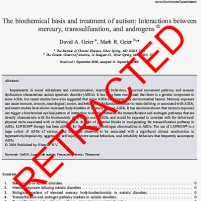Retraction Crisis Hits Scientific Journals
Wednesday, April 18, 2012

Three scientific journals have published articles over the past two years warning of the rise in retractions and misconduct by researchers who have fudged results.
The latest publication to do so was Infection and Immunity, which revealed it had been duped repeatedly by the same scientist, Naoki Mori of the University of the Ryukyus in Japan, who had also published questionable facts in other published papers.
A former editor of the publication, Dr. Arturo Casadevall, blamed “a winner-take-all game” in science today that has created “perverse incentives that lead scientists to cut corners and, in some cases, commit acts of misconduct,” according to The New York Times.
Another journal, Nature, reported last year a tenfold increase in retractions over the past decade even though the number of published papers only increased bo 44%. Before that, the Journal of Medical Ethics published a study in 2010 that said a rise in recent retractions was the fault of misconduct and “honest scientific mistakes.” It calculated that the number of retractions had more than tripled from 50 in 2005 to 180 in 2009.
Dr. Ferric Fang, the editor-in-chief of Infection and Immunity, pointed out that the increased competition for jobs may be a major contributing factor to the falsification problem. According to The New York Times, “In 1973, more than half of biologists had a tenure-track job within six years of getting a Ph.D. By 2006 the figure was down to 15 percent.”
-Noel Brinkerhoff, David Wallechinsky
To Learn More:
A Sharp Rise in Retractions Prompts Calls for Reform (by Carl Zimmer, New York Times)
Retracted Science and the Retraction Index (Ferric C. Fang, Arturo Casadevall and R. P. Morrison, Infection and Immunity)
Medical Journal Retractions Skyrocketing (by Noel Brinkerhoff, AllGov)
- Top Stories
- Unusual News
- Where is the Money Going?
- Controversies
- U.S. and the World
- Appointments and Resignations
- Latest News
- Trump Orders ICE and Border Patrol to Kill More Protestors
- Trump Renames National Football League National Trump League
- Trump to Stop Deportations If…
- Trump Denounces World Series
- What If China Invaded the United States?






Comments